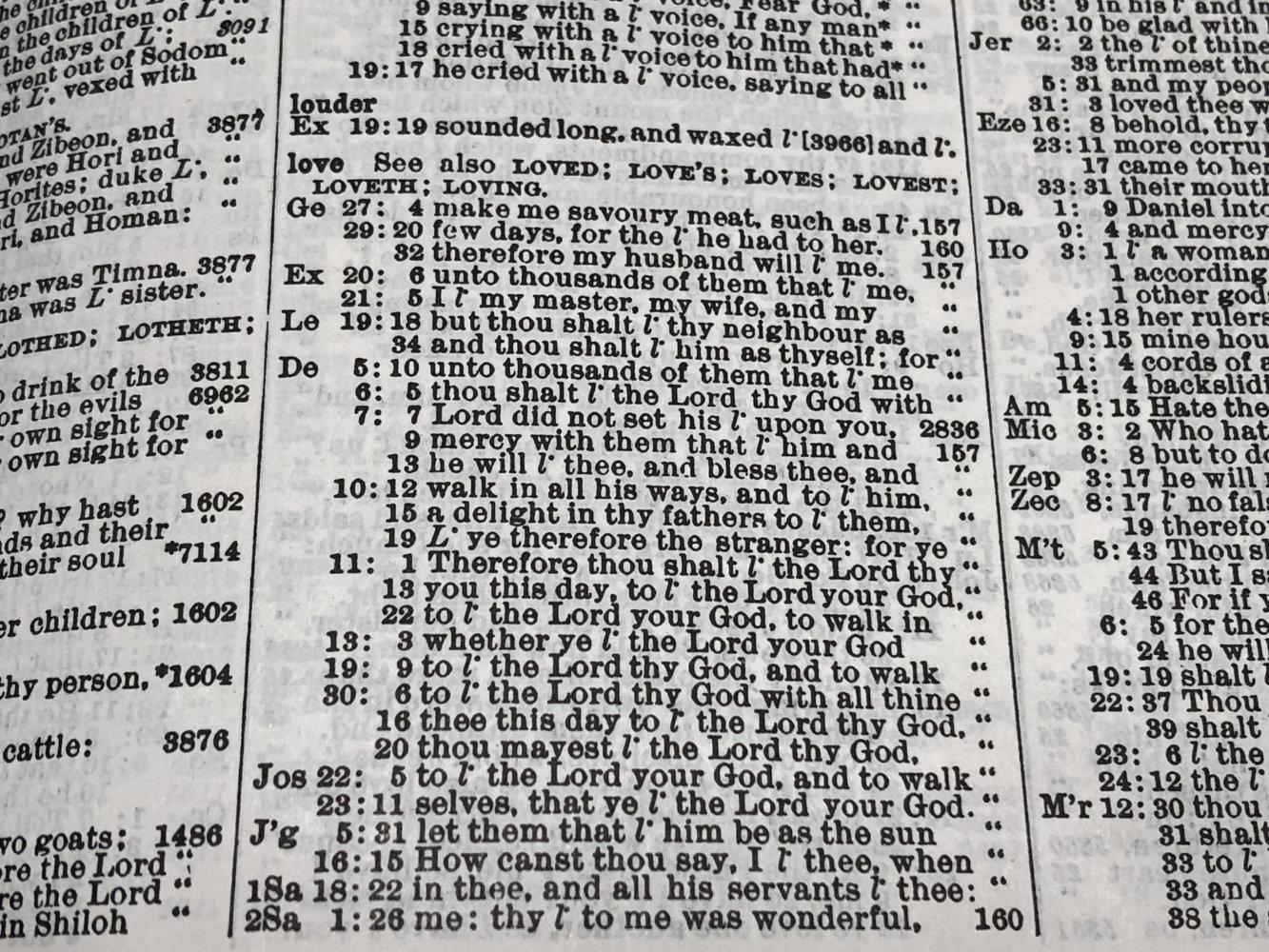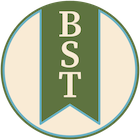Have you ever had a moment when a verse comes to mind you want to share? You can remember the gist of the verse, but cannot recall its location. What do you do in those moments? Do you keep quiet or flip through your Bible frantically looking for the passage? What if I told you there’s a better way? Would you be interested? If so, then let me tell you about Bible concordances.
Today I want to explain the different types of concordances you’ll encounter and show you various ways to use them in your Bible study. Let’s dive in!
What is a Concordance?
At its most basic, a concordance is an alphabetical index of words contained in a text. When you look at the back of a nonfiction book, you often will find an index. The index shows you the page where a given word, topic, or author is discussed in the book. This is essentially what a concordance does, but with the addition of citing the relevant passages. A Bible concordance shows you where words appear in the Bible. This is helpful when you’re trying to find a verse & cannot remember where it is.
When it comes to Bible concordances, there are essentially two kinds you will use for Bible study: a general concordance and an exhaustive concordance. I will also tell you about a third option.
Bible concordances are helpful when you’re trying to find a verse & cannot remember where it is. Click To TweetGeneral Concordance
A general concordance is likely what you’re familiar with and use most often. You will find this type of concordance in the back of your Bible. Because the Bible is a big book with lots of words, you will not find every occurrence of a word (or even every word) in a general concordance. Instead, only the most important words and the most relevant verses are listed.
General concordances are most helpful when trying to find a verse but you can only remember a word or two. But, I’ll talk more about that below.
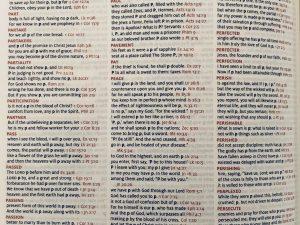
Exhaustive Concordance
An exhaustive concordance is your best friend when you start delving into the realm of word studies, which we will discuss in detail in a future Bible study tip. Unlike a general concordance, an exhaustive concordance lives up to it’s name, as it is truly comprehensive (sans common words like “a,” “for,” “the,” and the like). If you’ve never seen one, they are massive & often larger than your Bible.
Just about any word you can think of looking up, you will find in an exhaustive concordance. Not only will you find the word, but it will list every place that word occurs in the Bible. So, if you want to do a word study on “grace,” that’s a piece of cake with an exhaustive concordance.
Exhaustive concordances often include Strong’s numbers, which show you the Greek or Hebrew word a given word is translated from. This allows you to get into more advanced word studies, which I’ll also cover in a future tip.
The idea is simple, you can find whatever you’re looking for in an exhaustive concordance. Look up a word, find everywhere it appears in the Bible. The only real downside to exhaustive concordances is they are translation specific & are generally only found for the KJV, NASB, or NIV translations.
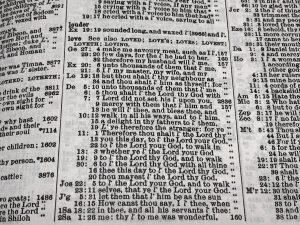
Bible Software
There is also a third option available to you: Bible software. Now, this isn’t a different type of concordance; instead, it takes a lot of what a concordance does and simplifies the process. For example, if you’re trying to find a verse you can just search for a word in that verse. The search results become your concordance. The same process applies if you want to find everywhere a word appears in the Bible. Additionally, most Bible software packages incorporate some form of an exhaustive concordance in their search functionality. This means, a simple search for a word can give you all sorts of information. See the screenshot below from Logos 7 as an example.
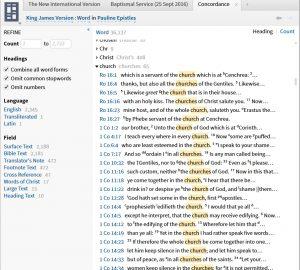
Outside of the general concordances in my print Bible, I do not own a physical concordance. Given the ease and power at my fingertips with Bible software, I much prefer it over owning a physical exhaustive concordance. This is one area where Bible software has a tremendous advantage over print.
Searching and concordances are some of the best ways to use Bible software. Click To TweetWays to Use a Concordance
Now let’s talk about how to use a concordance. First, up is when that verse is on the tip of your tongue but you cannot remember where it is.
Find That Verse
Let’s say you’re trying to find the verse that talks about the kind of peace that surpasses all understanding. To begin, key in on a word you think you can find in your concordance; in this instance we’ll use “peace.” Flip to the concordance and find the heading for “Peace” under P. Once you find it, scan the abbreviated verses for your verse. In my Bible there’s an entry that reads “And the p of God, which surpasses all – Phil 4:7.” That’s what you’re looking for. Now all you have to do is turn your Bible to Philippians 4:7 to read the verse in context.
Simple Word Studies
With an exhaustive concordance it is very easy to do simple word studies. Say you’re doing a study on the word “love” and you want to read every verse that mentions the word. The process is no more difficult than looking up a word in a dictionary. Find the heading for “love” in your Bible concordance and proceed to look up every verse listed in the concordance. Simple, right?
Want to go deeper? Take a look at those Strong’s numbers next to each line in your concordance. You’ll notice that some are different, meaning there are different Greek & Hebrew words that are translated as the English word. Now you can dig deeper and look up all of a specific Strong’s number. This simple technique can take your studies to another level.
Learn Greek & Hebrew Definitions
Another advantage of an exhaustive concordance is the ability to look up words by their Strong’s number. Say you’re studying the word “encouragement” and you find you want to dig deeper on Strong’s number G3874 associated with this word. When you look it up by it’s Strong’s number you can see it is translated a myriad of ways including: exhortation, comfort, consolation, etc. Now you have additional or related English words to study.
But, you also can use this as a simple way to learn definitions for Greek & Hebrew words. Now whenever you see the Strong’s number G3874 and its Greek word, you know the basic definition of the word is “exhortation” or “comfort.” If you’re a Greek or Hebrew student, this is one area where a concordance can be your best friend.
Get a Concordance
Have you ever used a concordance? This week, I challenge you to find a concordance and do some word studies. Each day this week, after you’ve finished your Bible reading, find a word or two in the passage that interests you & look it up in an exhaustive concordance.
What do you learn about these words in the process? Were you surprised by what you learned?
I’d love to hear about the words you studied and what you found. Leave a comment or send me an email sharing your findings.
Weekly Study Prompts
This week, meditate and journal on the following passages:
- Monday – Exodus 32-33
- Tuesday – Exodus 34-36:1
- Wednesday – Exodus 40
- Thursday – Leviticus 8-9
- Friday – Leviticus 16-17
- Memory Verses: Exodus 33:16; Matthew 22:37-39

